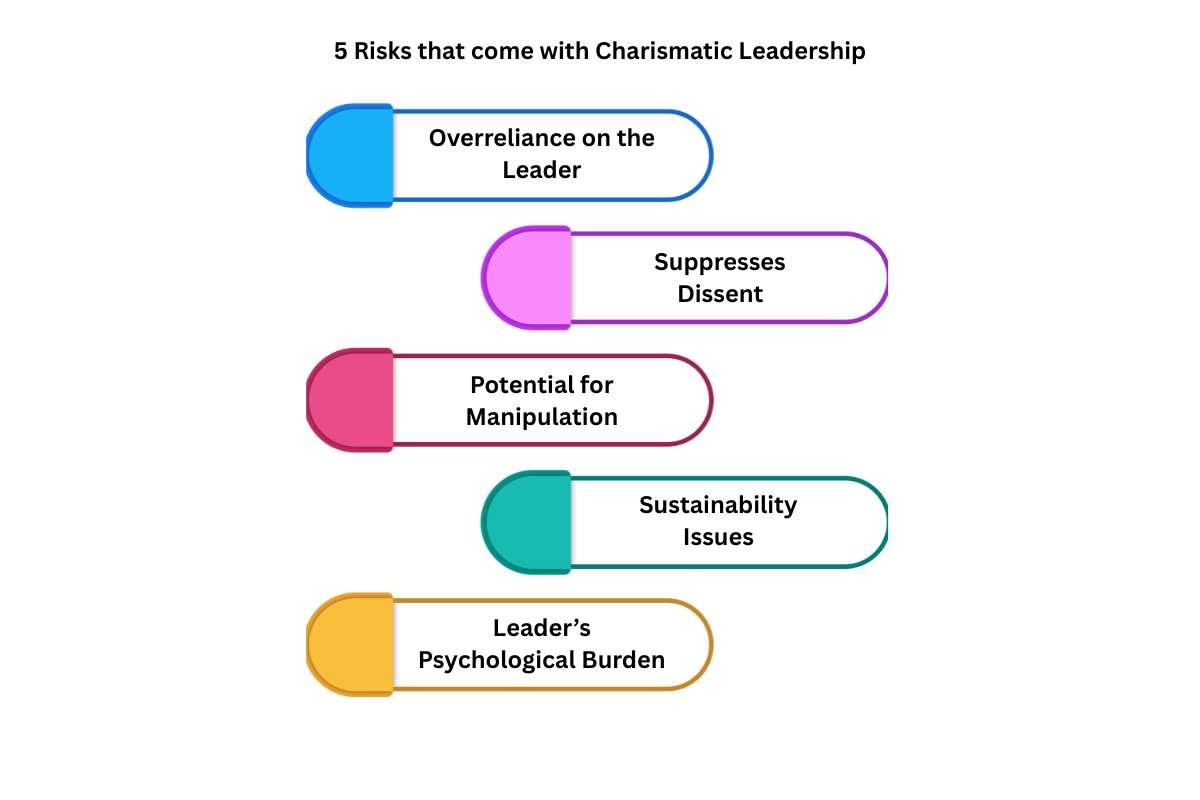Do you know what Martin Luther King Jr., Mahatma Gandhi, Mother Teresa, and Obama have in common? It is their style of leadership. They were all charismatic leaders, leading people for the causes that mattered to them. So, what is Charismatic leadership? And most importantly, how to be one?
In this blog, we will go through everything you need to know about charismatic leadership, from what it is, its key characteristics, benefits, challenges, and last of all, how to develop it. So, let’s get right into it, shall we?
What is Charismatic Leadership?
The concept of charismatic authority originates from the book, The Theory of Social and Economic Organization, by Max Weber. He applied it to leaders who command influence through an exceptional personal aura. This aura is often seen in prophets or revolutionary figures.
He derived the term, Charismatic authority, from the Greek word, Charisma, which means divinely conferred power or talent. He used it to describe a form of leadership where followers perceive the leader as having extraordinary, gifted qualities.
In 1976, management scholar Robert House released research papers titled, Theory of Charismatic Leadership. House’s theory described how leaders with profound personal abilities could inspire extraordinary effects in their followers. This also included deep loyalty and devotion.
To simplify it for you, charismatic leadership is when a leader leads followers with their personality and vision. A leader who has the ability to connect with the followers on an emotional level is a charismatic leader.
Which brings us to the main point: what are the characteristics of a charismatic leader? So, let’s take a look at that.
Key Characteristics of Charismatic Leadership and Do You Have Them?
Here are 10 characteristics that a charismatic leader must have:

1. Communication Skills
Every charismatic leader, whether we are talking about Obama, Buddha, or Jesus, all of them knew how to convey their message. A good leader must have great communication skills. You must be able to communicate your points clearly and directly.
This helps to inspire employees through tough times. It also helps them stay grounded when things are good and in their favor. The leaders are equally comfortable interacting with individuals as well as groups.
2. Maturity
Another key characteristic of charismatic leaders is maturity. Every strong leader has a strong and powerful personality, but what makes a charismatic leader stand out is their maturity and character. They do not believe in making vague statements. Instead, they focus on using their knowledge and experience to help a business grow.
A charismatic leader does not believe in empty showmanship; rather, they believe in actions. They are not afraid of accepting their mistakes and learning from them. And, most importantly, they never miss out on an opportunity to learn from others, regardless of who the person is.
3. Humility
We named Mother Teresa and Mahatma Gandhi in the very first paragraph of this blog, and rightfully so. They are a perfect example of this characteristic of a charismatic leader. Every charismatic leader in history had humility. They value every employee, from the lowest of the corporate ladder to those at the top.
Charismatic leaders treat each of their employees with equal respect and dignity. And they listen to their concerns, patiently. Having humility allows you to connect with your team on a personal, emotional level. And this is what inspires loyalty among your followers.
4. Substance
Charisma without substance is like a lamp with no oil. While it might burn for a while, the flame will burn out eventually. As a charismatic leader, you must be active, influential, and participatory. You cannot make fake promises to your employees; delivery is a must. And this brings in employees’ trust in return.
The showy and glamorous appearance will capture people’s attention. But slowly but surely, employees will want something more substantial beneath the smokescreen. Charm gets you the face time, but it is the substance that closes the deal.
5. Confidence
Confidence is the key. Every charismatic leader has the confidence to enchant and lead a multitude. It is what makes them stand out from the rest. They know who they are, and they show it off to the world. They don’t pretend to be someone else. They don’t try to be someone; instead, they already are someone.
One of the main differentiators of charismatic leadership is how confidently a charismatic leader holds themselves. And this confidence flows from you into your team, automatically. Always remember, a confident leader will lead a confident team.
6. Body Language
One of the signs of a charismatic leader is that they are warm, welcoming, and friendly. Body language plays a major role in how people perceive you. How you talk, look, stand, and sit tells everyone who you are and the weight your presence carries. The point is not to look good, but to look welcoming.
Whenever you meet people, greet them with joy and make eye contact. The point is, people should see you as someone approachable and friendly. Exhibiting positive body language is a big sign of a confident person and a great leader.
7. Good Listening Skills
Being a good listener is a rare skill. A good charismatic leader is a great listener. We say this because you won’t see them lost when you have a conversation with such leaders. They are attentive, focused, and poised when you tell them something.
You see them fully engaged in the conversation, and they show empathy and care when you relate to them. They are not lost in their world; they are firm in your words. Active listening is a must-have skill in charismatic leadership. You cannot be a good leader if you’re not a good listener.
8. Compassion
Confidence isn’t enough. Charisma without compassion is like a tree without water; it will eventually die. A great leader has great compassion. Look at any charismatic leader in history, and all of them were driven by compassion. Compassion is the core of a good human and a great leader.
Compassion, integrity, honesty, and fortitude are qualities that successful charismatic leaders display. Being charismatic without compassion, like Hitler, will lead to mere hero worship and inevitable failure.
9. Self-monitoring
A boss will look at where the employee lacks, and a leader will look at where they are lacking. One of the key attributes of a good charismatic leader is the leader’s ability to evaluate themselves.
A good leader knows the power they hold, and they understand that everyone is watching them. So, they monitor themselves and make sure they are leading by example and not just words. They keep themselves in check and make sure their team does the same.
10. Visionary
And last of all, every charismatic leader has a vision, a dream that they believe in. When Martin Luther King Jr. said, “I have a dream.” It showed his charisma and how influential his presence was. We get inspired by that speech because we know he had a vision, and he truly believed in it.
Similarly, every other charismatic leader is a visionary. They have a clear plan and dream that they follow and hope to accomplish. They are confident in their dream; they believe in the dream. And this is what makes people believe in their dreams as well.
So, these are the 10 key characteristics of charismatic leadership, but that isn’t all! There is more. Let’s talk about the advantages and disadvantages of a charismatic leader.
5 Benefits and Risks of Charismatic Leadership to Know About
| Benefits | Risks |
|---|---|
| Inspires and motivates teams | Overreliance on leader |
| Promotes unity and collaboration | Suppresses dissent |
| Improves performance | Potential for manipulation |
| Encourages innovation | Sustainability issues |
| Cohesion and Loyalty | Leader’s Psychological Burden |
Let’s go through each of the advantages and challenges with charismatic leaders, one by one, shall we?
5 Advantages of Charismatic Leadership You must Know About

1. Inspires and Motivates Teams
A charismatic leader keeps the team inspired and motivated all the time. They do that with their strong vision, strong personality, and persuasive conversation skills. This boosts team morale, engagement, and productivity.
2. Promotes Unity and Collaboration
Every charismatic leader, whether good or evil, has united their country, city, or organization. Think about Mahatma Gandhi, Fidel Castro, and even Lincoln. All of them brought unity and collaboration to their followers. A good charismatic leader unites and promotes collaboration in their team.
3. Improves Team Performance
By inspiring, collaborating, and communicating, a charismatic leader improves the performance of their team. A charismatic leader makes the employee trust them, achieve shared goals, and go above and beyond in task completion.
4. Encourages Innovation
A team under charismatic leaders is trained to take risks and find unconventional solutions to all its problems. This is mostly due to charismatic leaders themselves being risk takers. This type of environment makes the team innovative and full of ideas.
5. Cohesion and Loyalty
Now there is a bright side to look at the risk mentioned above. Followers tend to unite around the leader’s vision. This leads to a sharp sense of belonging, loyalty, and shared purpose within the team. A team is united and loyal under a charismatic leader.
5 Risks that come with Charismatic Leadership

1. Overreliance on the Leader
The biggest issue with having a charismatic leader is that the team starts relying on them to an extreme point. This overreliance can kill the individuality of your team members. While having a strong leader is great, losing yourself in reliance on them can be hazardous.
2. Suppresses Dissent
Charismatic leaders tend to become cult personalities. Sometimes, this can lead to them being surrounded by yes-men. There is nothing wrong with people praising you, but when it isn’t partnered with a good amount of criticism, it leads to the suppression of dissent. And this is the biggest fear about having a charismatic leader.
3. Potential for Manipulation
Charisma can be rather persuasive. And many times this persuasive power can be misused. A charismatic leader might manipulate followers for their own personal gains. One such example is Adolf Hitler. He is one of the most popular charismatic leaders, and we know how he manipulated an entire country into war, just by being charismatic and persuasive.
4. Sustainability Issues
While having a charismatic leader is great, what happens when the leader leaves? This is the biggest challenge every organization led by a charismatic leader faces. Organizations can struggle with transition and loss of momentum when a charismatic leader departs. It is more than likely that the followers will not voluntarily adjust to new leadership.
5. Leader’s Psychological Burden
Now, we have spoken a lot about the impact charismatic leadership has on the organization, what about the impact on the leader? The constant expectation to be inspiring can create stress, isolation, and distort self-perception for the leader. Too many expectations can be dangerous for the mental state of any human.
Now that we know the benefits and risks of having charismatic leaders, let’s take a look at how you can be a charismatic leader yourself.
A Guide to Being a Charismatic Leader
Becoming a charismatic leader means you have to develop specific skills and behaviors that inspire and motivate others. It’s not an innate trait but a collection of learnable qualities. The goal is to build genuine connections, articulate a compelling vision, and project confidence.
Here’s how you can be a charismatic leader:

- Exceptional Communication: Charismatic leaders are master communicators. They articulate their vision clearly and with passion. This includes telling stories, anecdotes, nonverbal cues, and listening to your team.
- Self-Confidence and Conviction: You must believe in yourself and your vision for others to believe in you. This involves having an authentic voice, self-awareness, and most importantly, a positive attitude.
- Empathy and Emotional Intelligence: The ability to understand and share the feelings of others is crucial. It is important to recognize your own vulnerabilities and show that you understand the challenges your team faces.
- Visionary Thinking: Charismatic leaders offer a clear and inspiring vision of the future. Understand what you want to stand for and what you want people to believe in. Share your vision with passion and conviction. Make sure you explain not just what you want to do but why it matters.
So, where to start? How can you start your journey into being a charismatic leader? Well, here are some things you can put into practice to become a charismatic leader.
- Work on Your Public Speaking: Join a public speaking club or take a course to practice speaking clearly. Learn how to speak with conviction and use likable body language.
- Seek Feedback: Ask trusted colleagues or a mentor for honest feedback. Ask them for their thoughts on how you communicate and what impression you make. Use their insights to improve.
- Find Your Passion: Identify what you are truly passionate about. Let that enthusiasm fuel your leadership. Genuine passion is contagious.
- Listen More Than You Talk: Make an effort to actively listen to everyone. Whether you are talking with junior employees or senior colleagues. This shows respect and values them. And it also helps you gain a deeper understanding of your environment.
- Lead by Example: Be the person you want your team to be. Your actions, integrity, and work ethic will inspire others more than your words ever could.
Also Read:
- Navigating Excellence: A Comprehensive Exploration of Leadership Models
- Unleashing Potential: A Deep Dive into Transformational Leadership Theory
- Leading Change: Unveiling the Power of Transformational Leadership Style
Charismatic Leaders and How They Changed the World
Let’s take a look at all the charismatic leaders in the world and how they influenced the world.
1. Martin Luther King Jr.

Martin Luther King Jr. was a central figure in the American civil rights movement. His charisma came from his exceptional oratory skills. His “I Have a Dream” speech is a prime example of his ability to articulate a powerful, hopeful vision. His speech resonated with millions and stirred up a movement.
He was instrumental in the passage of the Civil Rights Act of 1964 and the Voting Rights Act of 1965, which legally dismantled racial segregation in the United States. He fundamentally changed the social and political landscape, inspiring a global struggle for human rights.
2. Nelson Mandela

Nelson Mandela was a revolutionary who fought against the apartheid system in South Africa. After spending 27 years in prison, his subsequent leadership was marked by a spirit of forgiveness and reconciliation. His charisma was defined by his humility, steadfast principles, and a deep commitment to national unity.
He led the successful negotiations to end apartheid. Eventually, he became South Africa’s first democratically elected president. His dedication to a “Rainbow Nation” prevented a civil war and set an example of peaceful transition and reconciliation for the entire world.
3. Steve Jobs

Steve Jobs was the co-founder of Apple Inc. and a visionary who revolutionized multiple industries. His charisma was rooted in his intense passion for innovation, a relentless focus on design, and his ability to persuade people to believe in a product that didn’t yet exist.
He led the creation of products like the Macintosh, iPod, iPhone, and iPad. He changed the way people interact with technology, media, and communication. His emphasis on user-friendly design and seamless integration created a new standard for consumer electronics and launched the modern smartphone era.
4. Alexander the Great

Alexander the Great was a king of the ancient Greek kingdom of Macedon. He is famous for creating one of the largest empires in history. His charisma was built on a reputation for courage, military genius, and a shared sense of purpose. He wasn’t just a commander; instead, he fought alongside his men, earning their loyalty and respect.
Through his military campaigns, he spread Greek culture, language, and philosophy across a vast area, from Greece to India. This era, known as the Hellenistic Period, led to a blend of Eastern and Western cultures. His exploits essentially shaped art, science, and governance.
Conclusion
Charismatic leadership is an active and powerful style that goes beyond simple management. It’s about a leader’s ability to forge an authentic, emotional connection with their followers, inspiring them through a clear and compelling vision. By embodying qualities like empathy, humility, and unwavering confidence, charismatic leaders can organize teams and promote innovation.
However, this leadership style is not without its challenges, including the risk of over-reliance on the leader and the potential for manipulation if not grounded in ethical principles.
Ultimately, charisma is a skill that can be developed and refined. By focusing on improving communication, actively listening, and leading with passion and integrity, anyone can cultivate the traits of a charismatic leader. The legacy of historical figures like Martin Luther King Jr., Nelson Mandela, and Joan of Arc demonstrates that authentic charisma, when coupled with a noble purpose, has the power not only to inspire but also to fundamentally change the world for the better.
FAQs:
1. Is charismatic leadership a born trait or can it be learned?
No, charismatic leadership is not an innate trait. It is a skill set that can be developed through deliberate practice.
2. How does charismatic leadership differ from transformational leadership?
Charismatic leaders rely on their personality and charm to inspire followers, creating a strong, almost worshipful bond. In contrast, transformational leaders focus on developing and empowering followers.
3. What are the ethical considerations of charismatic leadership?
Charismatic leadership carries significant ethical considerations due to the immense power and influence a leader holds over followers. The primary concern is the potential for manipulation and abuse of power. A charismatic leader’s persona can lead followers to blindly accept their actions, even if they are unethical or harmful.
4. Can a leader be charismatic without being a good person?
Yes, a leader can be charismatic without being a good person. Charisma is a value-neutral tool for influence. Historical figures like Adolf Hitler prove that the ability to inspire a powerful following is separate from a person’s moral character or ethical intentions.










